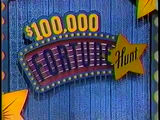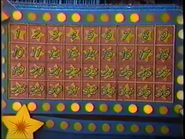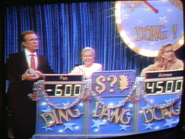| Hosts | |
| Jeff Coopwood (1989–August 1990) Mike Jackson (August 1990–1994) | |
| Co-Host | |
| Linda Kollmeyer | |
| Announcer | |
| Bill Barber | |
| Broadcast | |
| Illinois Syndication/WGN Superstation (Weekly): 9/16/1989 – 7/2/1994 | |
| Packager | |
| WGN-TV/KRT Productions | |
$100,000 Fortune Hunt was the Illinois Lottery's first of three game shows, and the first lottery game show to air nationally via what is now NewsNation.
Gameplay[]
Six people would take turns picking numbers from a board of 36 trilons. Co-host Linda would then rotate the trilon; a positive money amount was added to the player's score, while a negative one took that amount away (although scores could never go below zero).
Other spaces on the board included:
- Double – If the player uncovered this, he/she immediately picked another number off the board, winning double the amount revealed (this only applied to positive values). If another Double was found with this pick, it was simply ignored for the purposes of scoring and the player picked another square. This space was a red star with the word DOUBLE written across it in capital letters.
- Free Turn – The player earned a Free Turn token which could be redeemed at any time for an additional selection from the board.
- Lose a Turn – The player got nothing for that turn. Originally, the symbol was a sad emoticon with "Lose a Turn" at the bottom; later, this became "TURN" in a no symbol.
- Bankrupt – The player who selected this lost his or her entire score. The space was a dollar sign in a no symbol.
- Decision – The player who selected this could accept a prize (originally a car in the first three rounds and a luxury vacation in the last two, later a car only) and leave the game, or pass and continue; this space was a red star with a question mark over it (later on, the question mark was replaced with the word CAR or TRIP, depending on the round). Later in the show's run, this symbol was replaced with ½ Car, which was represented by the front of the car in the first three rounds, and the back of the car in the last two; players had to find both halves to claim the car (if desired).
- Wipeout – The player who selected this was eliminated from the game and received a consolation prize of $1,000, regardless of their score at that point. This space, which simply consisted of a sad emoticon, was only present for the first four episodes, being replaced on October 14, 1989 by Lose a Turn.
Five rounds were played (with dollar figures increasing in the final two rounds on a new board), and the player with the most money had their total bumped to $100,000. In the event of a tie, the tied players continued picking numbers until the tie was broken. Each of the other contestants were guaranteed at least $1,000.
Originally, after the main game, the remaining players would have the option to keep their winnings or make a pick off a 12-square Bonus Board containing merchandise prizes and cash amounts ranging from $1,000 to $10,000. This was removed on April 14, 1990.
Beginning on January 2, 1993, $100,000 winners could return for up to five weeks, giving them a chance to win up to $500,000.
Home Player Game[]
Originally, each player had two home players; each was guaranteed $100, bumped to $500 in the event of a win. This was also removed on April 14, 1990.
Bonus Play[]
Coinciding with a change in the design of the scratch ticket on April 14, 1990, a new at-home element was introduced involving a detachable stub on each ticket. Each contestant would be designated with a letter. At the end of the show, home viewers would be given a chance to win $100 playing the at-home Bonus Play game. The winning contestant spun a wheel with 10 spaces numbered 0-9.
The winning number would consist of the $100,000 winner's letter followed by a 4-digit number which the studio contestant created with four spins of the Bonus Play wheel.
Any home viewer whose Bonus Play numbers matched the contestant's letter and the four digits in the order they were spun would win $100. The Bonus Play numbers were scratched off on the stubs; home viewers had to mail them in along with a postcard to the lottery offices to collect. Any losing stub was still good.
Originally, the contestant podiums had the letters A-F on them. For a period of time in June and July 1990, a second set of letters (G-L) were added, with the first set eventually removed on July 21.
All home player elements were removed sometime between April 13, 1991 and July 1991.
Rating[]
Trivia[]
- Original host Jeff Coopwood left The $100,000 Fortune Hunt after the August 11, 1990 episode, with Mike Jackson taking over the following week. Per an interview he gave with Slow Boat To The Land of Parting Gifts in March 2015 (see here), the Lottery tried to rewrite the terms of his and Linda Kollmeyer's contracts from annual guarantees to six-month periods with no guarantee of renewal. Since the show's ratings were phenomenal (boosted by it also airing on WGN's Superstation feed), Jeff was fulfilling all the terms of his agreement, and the Lottery was making millions off the show, he said no. He also stated that, because he had refused to renegotiate his contract, the Lottery concocted the lie that he was fired.
- On August 9, 1990, shortly after his departure, the Chicago Tribune reported that Jeff's departure was due to not renewing his contract, which is consistent with his interview comments. Then it was subsequently reported that the Lottery claimed Jeff was fired due to wearing Lottery-owned suits outside of work, which is also consistent with his interview comments. At the time, Jeff had responded that he had been subjected to Lottery retaliation and attempted harassment.
- Parts of the set made a cameo appearance in Home Alone 2: Lost in New York (released November 20, 1992) as the show "Ding Dang Dong" (with Bob Eubanks as host) that Kevin watches near the beginning of the movie.
Spin-Offs[]
Hoosier Millionaire - Spinoff for the state of Indiana from 1989-2005.
YouTube Links[]
1989 "teaser" promo for the show and scratcher (has a noticeably different set)
Two local news reports on the show from September 8, 1989 (including clips of a rehearsal game)
Full Episodes[]
The majority of these are complete with original commercials, recorded from their local WGN broadcasts and uploaded by Jeff Coopwood himself. Many of these shows also include at least part of that night's presentation of the state's Daily Game, Pick 4, and Lotto draws.
September 16, 1989 premiere show
September 23, 1989
September 30, 1989
October 7, 1989
October 14, 1989
October 21, 1989
October 28, 1989
November 4, 1989
November 11, 1989
November 18, 1989
November 25, 1989
December 2, 1989
December 16, 1989
December 30, 1989
January 6, 1990
January 13, 1990
January 27, 1990
February 3, 1990
February 10, 1990
February 17, 1990
March 3, 1990
March 10, 1990
March 17, 1990
March 24, 1990
March 31, 1990
April 7, 1990
April 14, 1990
April 21, 1990
April 28, 1990
May 5, 1990
May 12, 1990
May 19, 1990
May 26, 1990
June 2, 1990
June 30, 1990
July 7, 1990
July 14, 1990
July 21, 1990
July 28, 1990
August 4, 1990
August 11, 1990 (Jeff's last show)
April 13, 1991




